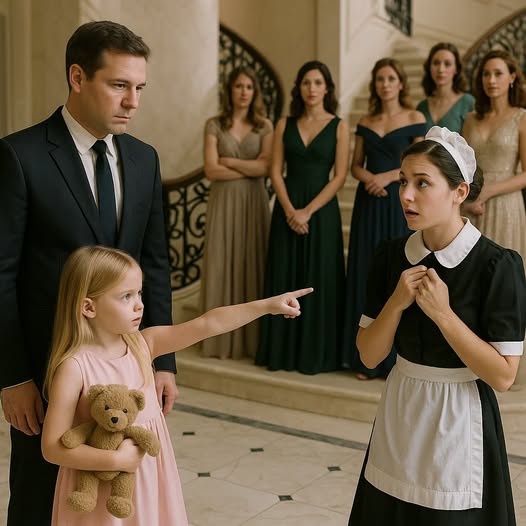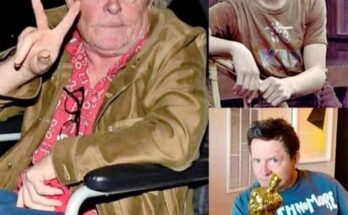
Afternoon light shattered into gold across the Langford manor—crystal chandeliers tossing brightness over marble in a way that made everything look more expensive, more untouchable. White-gloved servers drifted through a hush of money and perfume, silver trays steady as metronomes. A quartet bowed a soft waltz in the corner; cameras idled at the fringes, lenses blinking like patient eyes.
It was supposed to be another Christopher Langford production—precise, curated, controlled. Billionaire. Builder of empires. Master of outcomes.
Then a small voice, bell-clear and impossible to ignore, threaded through the music.
“Daddy, I choose her.”
The room stopped breathing. Heads lifted. Bows hovered an inch above strings.
Six-year-old Evie Langford, hair ribboned in pale pink, stood on tiptoe beside her father’s chair and pointed—not at the elegant row of women arrayed like gemstones along the ballroom’s edge—but toward the far wall, where a young housekeeper balanced a silver teapot and a quiet smile.
The housekeeper froze. The tray didn’t. It trembled.
A Party with a Plan
This was not, strictly speaking, a party. On the invitation, it had read: Brunch to Benefit Children’s Literacy. The guest list knew better. Ever since Amelia Langford had died three years earlier—gone in a single, brutal night that left whispers and a hole in the house—Christopher had worked more, traveled more, hosted more. He conquered time zones and ledgers, but not the lonely quiet that settled on his daughter’s shoulders each evening.
So, in the only language he truly trusted, he arranged a solution.
Twelve women. Models, philanthropists, polished widows who understood the choreography of wealth. They drank champagne and spoke graciously about children, foundations, balanced lives. A publicist called it “introductions.” Privately, more than one guest called it an audition.
Evie sat like a porcelain figurine at the head of the long table, legs swinging just above the carpet. She nodded to the women, eyes shining on cue. But whenever the housekeeper passed—dark hair twisted back, apron clean even after three hours—Evie tracked her with a soft, searching gaze.
“You Read to Me When Daddy’s Late”
When the final glass was poured and the final name recited, Christopher knelt beside his daughter. The cameras tightened their focus. The quartet softened to a murmur.
“Sweetheart,” he said, measured and warm, “you’ve met all the ladies. Which one do you think might be a good mother for you?”
A breathless hush rolled the length of the table. Smiles poised like arrows.
Evie didn’t look at any of them. She lifted her arm and pointed across the room.
“I choose her.”
The housekeeper startled. “M-me? Miss Evie, no… I’m just—”
“You’re kind to me,” Evie said simply. “You read to me when Daddy’s late. I want you to be my mommy.”
The quartet stopped. The chandeliers hummed louder. One woman laughed, tight and brittle. Another whispered, “Surely she’s joking.”
Evie wasn’t.
The Man Who Had a Script for Everything—Except This
Christopher Langford could price a company in six minutes and win a hostile vote in three. He had a binder for outcomes. He had no page for this.
“Evie,” he began gently, the way you might coax a bird off a ledge, “Mara works here. She can’t—”
“She already does,” Evie murmured, arms crossed, small mouth set. “You just didn’t notice.”
That night, after the cars bled off into long driveways and the String Quartet packed their velvet cases, the mansion sounded too big. Upstairs, Evie slept. The housekeeper—Mara Alvarez, the HR file said—had tucked her in while Christopher lingered outside the door, unsure of who, exactly, needed permission.
He sat alone in his study until the ice in his glass turned to water and the water to a ring on his desk. A thought kept circling, patient, relentless: What if control is not the same thing as care?
Who Is Mara?
Midwestern quiet. A scholarship that didn’t stretch far enough. Nights cleaning rooms and mornings studying anatomy flashcards. A mother who got sick; a degree deferred to go home and care. “Temporary” work with agencies, then a seasonal role at Langford Manor that turned permanent when the head housekeeper noticed how the little girl followed Mara from room to room, steady as a shadow.
“She was different,” said Dana, the chef, months later. “She learned Evie’s bedtime songs before she learned where we keep the copper pots. She braided hair with hands that never shook.”
“It wasn’t charity,” Mara would say. “She was just… lonely. I knew that language.”
The Morning After
Evie came to breakfast in pajamas and resolve.
“If you tell her to leave,” she said, spoon suspended over her cereal, “I won’t talk to you, Daddy. Not ever.”
“Evie,” he tried, “that isn’t fair.”
Her chin trembled. “You don’t see people. You see what they can give you.”
The words landed like a closed door.
Christopher canceled a stack of meetings. He sat at the long kitchen table instead. He listened to Evie talk about spelling words and playground rules. He asked Mara to join them. He watched how the room shifted when she did—how the staff loosened, how Evie’s shoulders lowered a fraction, how the house felt less like a museum and more like a place that kept warmth.
When the Walls Learn to Breathe
Weeks moved differently after that. The ballroom hosted pillow forts instead of galas. The grand piano sounded out “Chopsticks” more often than Chopin. Christopher noticed patterns he’d missed: the way Mara saved the last slice of his late wife’s lemon cake for the anniversary without speaking it aloud; how she left a note for Evie’s teacher on the days a headache crowded the little girl’s eyes; how she knew when to stay and when to step back.
“It’s not just that you’re kind,” he said one evening, finding Mara at the sink after lights-out. “It’s that you make kindness feel… normal.”
Without turning, she smiled. “Children don’t need extraordinary,” she said. “They need consistent.”
He looked at his reflection in the dark window—the version of himself built on outcomes and returns—and, for the first time in years, didn’t recognize the man wearing his suit.
Breaking the Story Everyone Expected
A tabloid popped first, then a dozen more: BILLIONAIRE’S DAUGHTER PICKS HOUSEKEEPER OVER MODELS. Social media spit back its usual chorus—derision, delight, the smug certainty of strangers. Christopher declined to comment. He quietly released staff from their NDAs. Mara didn’t sell a story. She packed a lunchbox and practiced spelling with Evie at the kitchen table.
One afternoon, Christopher came home to a blanket fort strung between dining chairs, the good linen pressed into service as a rooftop. Evie’s laughter floated out; Mara’s voice followed, reading The Velveteen Rabbit.
“Daddy, come inside!” Evie called. “It’s better if all three of us are here.”
He hesitated. He took off his watch. He crawled in.
The space smelled like strawberries and laundry soap and paper. Christopher laughed—unpracticed, unarmored—and felt something inside him shift into place.
What Money Doesn’t Touch
Time, for once, wasn’t a resource to be mined. It was something to notice. The house traded donor dinners for movie nights, quarterly summits for picnic blankets. At work, a CFO murmured, “He doesn’t grab every deal anymore. He shows up for the ones that matter.”
Mara never asked for more than her job. Something unspoken knit itself in the quiet spaces anyway—respect first, then a thing that lived beside the word love without trying to outshine it.
By winter, Christopher asked for a different arrangement. Not a spectacle. Not a press release.
“Not because Evie wants it,” he said in the kitchen where everything true now seemed to happen, “but because I do. Because you remind me what care looks like when it isn’t purchased.”
Mara wiped her hands on a dish towel and held his gaze. “Then prove it,” she said softly. “Not to me. To her.”
A Different Kind of Estate
Two years later, the chandeliers still scatter light like diamonds, but they dangle over birthday cakes and lopsided science projects. The ballroom holds piano recitals and muddy sneakers lined near the door. The foundation Christopher funds in Mara’s name offers scholarships to domestic workers finishing degrees they put on hold for love.
Evie—eight now, ribboned and freckled—introduces Mara as “Mom” without watching anyone’s face for permission.
When a reporter asks Christopher what changed him, he doesn’t talk about market cycles or legacy.
“My daughter told the truth before I could hear it,” he says. “Love doesn’t follow logic. It follows kindness. The smallest voice in the room had the clearest map.”
And in the late quiet, when the house rests and the lights along the drive make a river of gold, three shadows move across a blanket fort’s stitched roof—father, mother, child—proof that some things are built, not bought, and that the heart learns its wealth by what it gives away.


